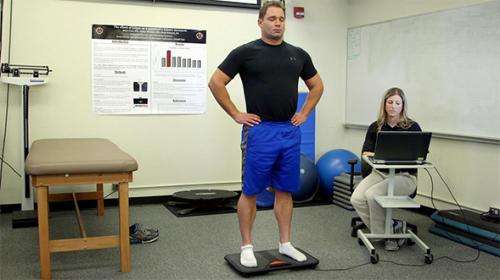Balancing out concussions

There are lots of ways to diagnose concussions in athletes injured on the field.
The standard battery of tests involve asking them questions on the field such as whether they feel woozy and if they remember recent events. Slightly more sophisticated tests involve asking them to stand in place and making a subjective judgment of their balance. The problem is, some athletes lie about symptoms or their memories in order to get back out on the field, and subjective measures of balance just aren't that reliable.
A team of biomechanics researchers at San Diego State University has created a quick, affordable and reliable device that can objectively assess an injured athlete's balance and help training staff determine whether it's likely he or she has a concussion.
Their balance tracking system, named BTrackS, is portable and about the size of a thin briefcase. Trainers can plug it into a laptop and have it set up and ready to go during games.
If an athlete gets injured, he or she stands on a balance board with their eyes closed and the machine provides objective feedback on an athlete's balance, measuring the amount of sway and converting that into a score. Trainers can then compare that to scores previously recorded when the athletes were healthy.
Daniel Goble, an assistant professor of exercise and nutritional science at SDSU who heads up the BTrackS team, said the device is a major improvement over traditional on-field cognitive tests or subjective balance tests.
"These athletes are smart, and they want to be out on the field, even if it puts their health at risk," he said. "They have tricks to pass the other tests. Balance is tougher to fake."
Goble and his team are presently working to obtain U.S. Food and Drug Administration (FDA) approval for BTrackS, as it is considered a Class I medical device. Once it has been cleared by the FDA, he expects to have it on the market by end of summer.
BTrackS has been developed through the Zahn Innovation Center, a commercial and social incubator that supports SDSU innovators and aspiring entrepreneurs as they transform their ideas into companies.
An affordable option
What will set BTrackS apart from other similar balance-measuring devices on the market will be its cost. Comparable devices right now cost around $10,000, Goble said. BTrackS will likely be under $1,000.
Goble published his initial findings showing the accuracy of the BTrackS in the Clinical Journal of Sport Medicine last year and has since tested the device on SDSU athletes including rugby players, soccer players, water polo players and swimmers/divers. He continues to fine tune the device and further the research base supporting its effectiveness. He and his colleagues are attending the National Athletic Trainers Association later this month to present BTrackS and gather feedback.
Other applications
Concussion detection isn't the only application Goble envisions for BTrackS. In time, he believes it will also be instrumental in helping to catch other balance-related medical concerns, such as falling in the elderly.
"Since many more individuals will be able to afford this gold standard balance assessment technology than in the past, BTrackS has the potential to transform the medical field," Goble said.
More information: "An Alternative to the Balance Error Scoring System: Using a Low-Cost Balance Board to Improve the Validity/Reliability of Sports-Related Concussion Balance Testing." Chang, Jasper O. MA, ATC; Levy, Susan S. PhD; Seay, Seth W. BSc; Goble, Daniel J. PhD. Clinical Journal of Sport Medicine: May 2014 - Volume 24 - Issue 3 - p 256–262, DOI: 10.1097/JSM.0000000000000016















